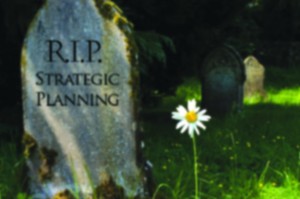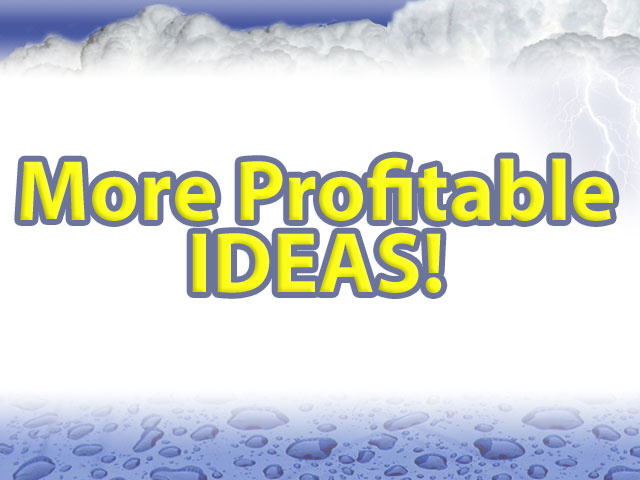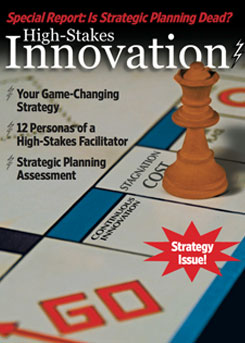 Let’s face it …Strategic Planning is Dead!
Let’s face it …Strategic Planning is Dead!
Or at least, in its current form, I think it should be.
Put it in the box. Shut the lid. Nail it tight. Drop it in the hole. Grab a shovel. Bury it.
You’re probably thinking … What do you mean Strategic Planning has bit the dust? Let’s get gut-level honest: Aren’t you sick of SWOT?
Is it possible there might be other systems, tools, programs, and/or techniques that might help your team create your Desired Future? For all the grandiose claims of company “innovation”, why is it that many strategic planning sessions are powerfully boring, marginally effective, and consistently unremarkable?
It’s easy to get stuck in the same rut as you drive your team down Strategy Street.
Here are 10 ways to mix it up and breathe new life into stagnant strategic planning. Any one of these ten elements can be explored or tweaked to produce a different set of expectations and results.
INTANGIBLES:
#1 Purpose: Why do you REALLY do Strategic Planning? Are you honestly using it to guide your daily (or yearly) efforts? Is it a fixed plan or a flexible one? Is it based on comparison to previous years (historically-based) or is it re-catalyzed every year by new market realities and opportunities (zero-based). Is your strategic planning geared toward providing “lanes” to guide your efforts or more toward providing “targets” to shoot for? What levels of accountability are set up for your team? Is your plan tied into incentive rewards and/or performance evaluations for your team members? Are the resources you are allocating to the strategic planning process in line with its true importance? What can you do to re-invigorate, clarify, and catalyze your Strategic planning process?
#2 Process: Review the #’s. Run through SWOT. Shallow BS (BrainStorming). Harsh evaluation. Choose least risky action items. Clap 3 times and go home. If your Strategic Planning Process has become this predictable, you risk losing a helpful sense of anticipation, creativity, and optimism from your team. Are you stuck in the same rut year after year? Have you re-analyzed and updated your ground rules and meeting guidelines to overcome known obstacles and streamline communication? Can you experiment with a different mix of models, systems, and tools to re-think your process? What can you do to engage the process at different seasons of your business and harvest the ideas of your “tribe” or the larger “crowd” prior to your actual strategic planning event? What surprising sparks (facts, stories, props, trends, experts, field trips, etc.) can you use to engage your team?
#3 FOCUS: Do your meetings tend to be Past-Based or Future-Based? Do you spend too much time looking in the rearview mirror, reviewing last year or reminiscing about the good old days? What can you do to create a “blank slate” mentality so that your team can have a fresh start? What are your processes for gathering cutting-edge trends and forecasts from a global perspective that could have an impact on your business? What can you do to build anticipation, helping your team to prepare BEFORE the meeting? Can you change your focus from Macro to Micro (or vice versa)? Can you change your focus from hitting homeruns to hitting singles (or vice versa)? Can you change the measures of success in a way that focuses on different metrics (value, impact, stewardship, etc.)? What can you do to combine both Global and Local perspectives?
#4 Theme: Can you experiment with the theme of the strategic planning process? This can range from 1-word themes (i.e. “Shift”, “Transform”, “Envision”) to full campaigns that morph into your company’s annual reporting theme. A good solid theme can set the expectations, the mood, and the results. How can you harvest the great ideas of your team concerning theme creation? How can you plan for Macro and Micro viewpoints? How can you design the theme into natural elements/sub-themes that feed the tone and capture the vision? Should you have a new theme every year or choose one that can provide multi-year focus? Strategic planning is kind of like the old joke about how you eat an elephant … one bite at a time. How can your theme build company-wide synergy, enhance and deepen relational bonds, and energize the troops (and shareholders)?
#5 Experience: What can you do to create a strategic “experience” that pushes your team to new limits, opens their eyes to revolutionary opportunities, and engages them in critical conversations? How can you make the strategic planning process positive, encouraging, and motivating rather than downbeat, tiring, and frustrating? How can all of these elements set the tone to gain momentum, create enthusiasm, and maximize results? What can you do to build pro-active attitudes, collaborative atmospheres, and a bias toward action? What can you do to transform your entire process into a remarkable team-building experience? Is there a way to create a learning experience by including key training elements within the SP process? Is it possible to strategically plan for a better strategic planning process?
TANGIBLES:
#6 TEAM: What can you do to broaden your base and involve ALL stakeholder voices (employees, customers, vendors, stockholders, community leaders, etc.) in your strategic planning process? How can you avoid the “Moses Syndrome”? (i.e. the negative effect that occurs when your super elite team comes back from the mountain with suntans and “the Plan”.) Have you seriously invested time in analyzing your team composition? Do you have the right people participating? Is there a strategic mix of old-timers and fresh faces? Is there an eclectic diversity of viewpoints (position, department, tenure, giftmix, age, gender, etc.)? How often do you rotate the responsibilities and rewards of participating on the team? What sub-teams can be formed to “feed the process” and build buy-in prior to the annual strategic planning meeting? How can you involve smart, confident, win-win minded people (insiders and outsiders) who know little about your past but can serve to provide fresh, outside perspective? What is your plan to cross-pollinate your strategic planning process with people who have different experiences, roles, and viewpoints?
#7 FACILITATOR: Have you grown a bit too comfortable with the person who is guiding your team? Are they still at the top of their game or have they become a bit too comfortable with your team? Are they still digging deep into your issues and uncovering buried treasure? Are they still able to maintain an unbiased distance, while provoking the team to re-think your business? Have they developed new tools to create cognitive dissonance and spark the conversations that need to be had? Can they wrangle the hidden elephants and distracting rabbits into fruitful hunting? Do they have enough intellectual firepower and multi-industry experience to energize the tone and outcomes? Do they know how to help you set up the process (pre-meeting planning expertise) for maximum results? Do they have a good sense of humor and non-arrogant confidence? Do they truly understand their role and that it’s NOT about them, but about YOU? Can they help put your team in challenging situations so that you can evaluate their attitudes, skills, teamwork, and engagement? What other resources (connections, programs, systems, etc.) can they bring to the table beyond their facilitation expertise?
#8 FORMAT: Have you been doing the same 1-2 day format for as long as you can remember? Are your people bored with it? What can you do to change their expectations and stretch their minds to “differently think”? Are you aware of (or willing to experiment with) other formats, tools, philosophies, and/or systems to produce remarkable results? Have you considered combining several different activities (rut-busters, team-building, pure ideation, conflict-resolution, strategic thinking, professional development, along with a burst of re-creational fun)? How can you capitalize on “morning energy” and overcome the afternoon “blahs”? Is participation in the strategic planning process seen as a reward, a privilege, or a burden? What can you do with the format to enhance the reward portion and reduce the burden? Are you using cutting-edge tools to save time, harvest ideas, and manage the process?
#9 TIMING: Should you start the strategic planning process earlier (or later)? Simply mixing things up can produce different results. Areyou totally locked into 1 fall/spring meeting with the same group of people? How about expanding the Strategic Planning Process to cover a broader time span? Or can you compact and tighten it up to produce greater results? Could you split your process up into multiple pieces and spread it out throughout the year? Could you go to a bi-annual process, allowing you to go DEEP during year 1 and WIDE during year 2? Can you combine it with another key company or industry event? How can you use the timing elements (season, cycle, calendar) to shake things up and produce better results?
#10 Location: How can your meeting location affect (positively or negatively) your outcomes? Is your meeting location adding to (or detracting from) the strategic emphasis of your process (i.e. Asian meeting if entering Asian markets)? Does your location choice spark excitement or create distraction? What message does your meeting choice location send about the event’s purpose? Do you want (or need) to mix business with pleasure or does this year’s meeting need to be “strictly business”? What are the pros and cons of off-sites vs. on-sites? Can you find an unusual meeting place that will enhance the results and enthusiasm? Or can you stay “home” and invest the travel budget savings to create an amazing new in-house “Innovation Center”. Can you find locations that provide a mix of “out of the office” flavor (team-building experiences), along with strategic activities (customer observations/tours, etc.)?
Don’t let your Strategic Planning Process meet an untimely death. Capitalize on these 10 life-giving elements and provocative questions to resurrect and re-think your strategic plan. Your team (and your stakeholders) will all benefit from a fresh approach and more productive results.
John Storm can help you go Beyond Strategic Planning™ during your next strategic planning process. Phone: (405) 321-6262


